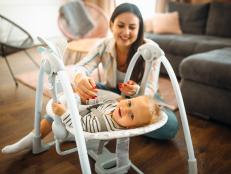Electronics and Sleep Are a Bad Combo for Teens, Study Finds
Good night, sleep tight, and hand over your technology.


Boy_Anupong
Screen time before bed may be a nightly occurrence for you. We’ve all been guilty of staying up too late scrolling through social media past our bedtime. The next day, we might need to grab an extra cup of coffee or hopefully get to bed earlier the following night. However, when it comes to your teens, this late-night scrolling affects them differently — and it may be time to kick all screens out of the bedroom. One study suggests that using technology before bed can turn into a vicious cycle for teens, and it can affect their health.
According to a new study, teens (especially middle schoolers) who spend time on technology — smartphones, laptops, gaming devices, or tablets — an hour before bed are likely to sleep poorly and be more tired the next day. That part seems pretty obvious, but here’s where it gets interesting.
Rather than the teens heading to bed early the next night, the technology and poor sleep combo turns into a vicious cycle that leads them to consume even more screen time at bedtime. So, the time they spend scrolling through social media, watching YouTube videos, or playing video games actually increases. Instead of turning out the lights and catching some zzz's, teens are staying up later — and when they do fall asleep, they’re not getting adequate rest.
For the study, researchers at National Sleep Foundation examined the effects of screen time at bedtime for 345 teens, ranging from 12 to 14 years olds, over a six-month period. Not only did screen time before bed disrupt the teens’ sleep, but it actually had what the researchers called "bidirectional" effects, meaning their poor sleep led to more bedtime media use the next night. This cycle persisted of media use, poor sleep, more media use, and even worse sleep. This makes us tired just thinking about it.
"Just having access to screen-based media devices in bedrooms has been associated with poor sleep quality and quantity among adolescents," said Heather Leonard, the study's lead author. However, Leonard adds, this poor sleep and technology at night cycle can result in difficulties with attention control, behavior, and their physical and mental health over time.
Before bed, teens should be winding down and preparing for sleep, but watching videos or playing games overstimulates their brains and the blue light from technology makes it harder to actually fall asleep. The next day, the teens who reported bedtime media use experienced more sleepiness, struggled to maintain attention, and even said they didn’t feel well.
So, what can parents do? This seems like one of those "do as I say and not as I do" parenting situations. Researchers from the study say the early teen years are the perfect time to set ground rules for technology at bedtime.
"I think in those younger years, you have a better chance as a parent to put down some ground rules and consistently enforce them," Leonard said. "You have an opportunity to build good habits and establish healthy sleep hygiene early on that they'll carry forward with them."
We already know that staying on our phones or tablets before bed isn’t healthy. So, we can model the behavior for our teens where everyone turns out the lights and heads to bed. The best part? We all get a better night's sleep! Basically, it’s a win-win for everyone in the house. Sweet dreams!
YOU MIGHT ALSO LIKE:















